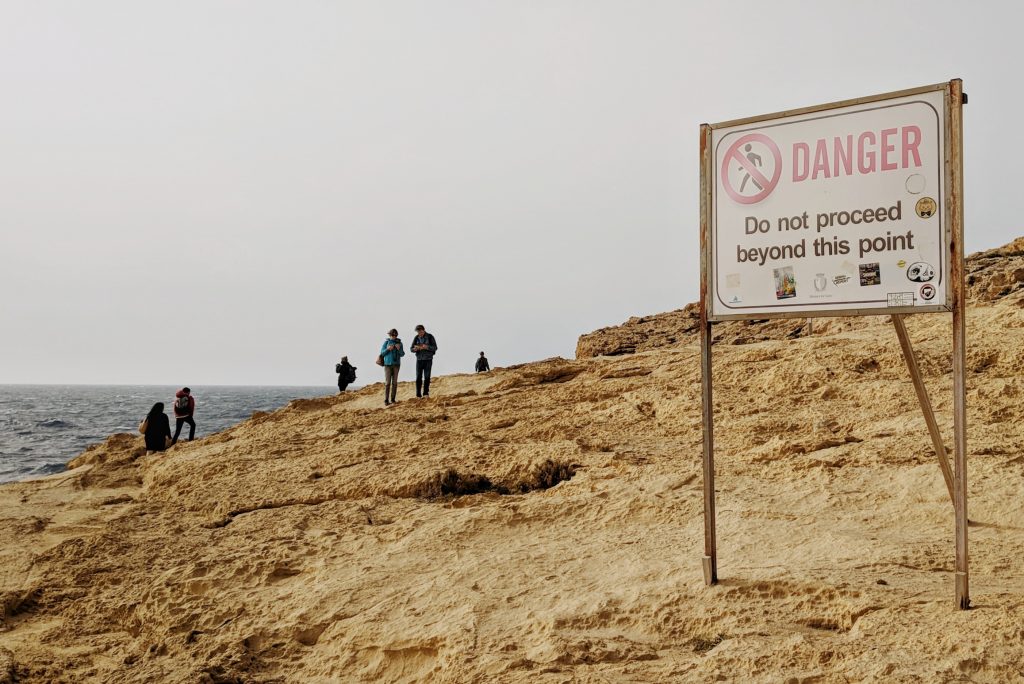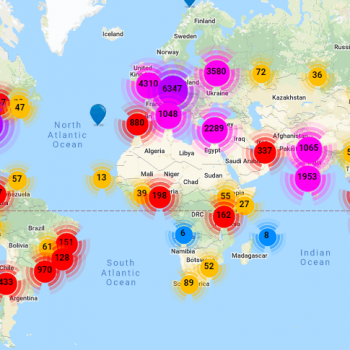In this article, we will cover some of the problems in startup ecosystems that we have identified at StartupBlink that are responsible for underperforming startup ecosystems. We will be discussing issues and the causes behind them that, if resolved, can enable entrepreneurs, government, and public officials to support and strengthen their ecosystem development within their city or country.
Risk Aversion Due to Lack of Education

You might be surprised to see risk aversion as the first and most prominent reason why a startup ecosystem might not be doing so well. It is true that the mentality of the local population can make or break the startup ecosystem.
The European Commission has identified education and the promotion of entrepreneurial attitudes, as a key ingredient towards sustainable regional development. They are aiming to promote entrepreneurial education in classrooms across countries, to drive innovation and stimulate young learners and future entrepreneurs to seize and create opportunities when they enter the workforce.
Specifically, the recognition of a need to “shift away from the tendency to equate entrepreneurship education with the practicalities of running a business to a broader definition in which it is seen as developing people who are entrepreneurial in all aspects of life” is key area that many European and non-European countries are struggling with currently.
The negative perception of entrepreneurship in certain countries, can be a drain on the drive and motivation of people to get involved, even though as the Organization for Economic Cooperation and Development has stated, “interest in entrepreneurship (is) an essential element to foster economic recovery and employment growth”.
Sociocultural Influences and Bad Image
The way sociocultural influences affect different startup ecosystems also fits in with the above mentioned discussion on risk aversion and lack of education.
Broadly speaking, our cultural background defines the values, behaviors, norms and actions within our community. A cultural setting that supports the entrepreneurial journey, like starting a new business or being self-employed, can positively influence the desire of someone to join and be active within a startup ecosystem. If the opposite is true, and the individual is met with resistance or cultural forces that perceive entrepreneurship as a negative or unworthy endeavor then that will be a burden on the ecosystem as a whole.
According to cultural dimensions theory, Hofstede Geert, the four dimensions of culture include power distance, individualism, uncertainty avoidance and masculinity. Subsequent research on entrepreneurial individuals has showcased a high presence of the dimension of masculinity (MAS+), and low values of uncertainty avoidance (UAV-) as well as a low power distance dimension (PDI-).
Some countries that follow this philosophy have indeed fostered strong startup ecosystems. However, more research would need to be completed on the vertical relationship between cultural dimensions and the success of startup ecosystems especially in places with rigid and strict power dynamics to get the full picture.
Lack of Trust and Social Capital
There has been a lot of research on the role of trust between active members of a startup ecosystem and the ways it can positively influence innovation and drive growth. While trust can also be broadly applied to the dynamics between business and the government, bureaucracy and public officials, here we will briefly touch on the idea of trust between members or fellow entrepreneurs.
Most successful startup ecosystems have a strong emphasis on collaboration and flow of information and resources. The idea of social capital and the strength of your network is what can introduce you to new ideas, create learning opportunities, and it also acts as the binding glue and a “social contract” that encourages individuals to reciprocate and collaborate with their peers.
When people trust each other, it is way more likely for them to embark on mutually beneficial projects and forge new business ideas. At the very least, finding a co-founder, or getting a second opinion on your new project is impossible in an ecosystem that promotes secrecy.
Lack of Actual Capital

From a logistical point of view, lack of capital, whether self-funding or from investors is one of the main problems that can cause a startup ecosystem to underperform.
Investors, especially during times of crisis like the current coronavirus pandemic, (link to article), are primarily concerned with ROI and as such will stay within or around startup ecosystems that have a proven track record and can showcase growth and innovation within their sphere of influence. Newly established or struggling startup ecosystems will have a harder time convincing investors to invest and as such might experience slower growth spurts.
When it comes to self-funding, which is even more crucial as it accounts for more than 98% of startups, lack of personal funds, friends or family support, due to financial insecurity in certain locations can also greatly diminish the ability of a startup ecosystem to flourish.
Lack of Government Support
Government support plays a key role on how a startup ecosystem can develop. In areas or locations where government support is lacking, not existent or opposed to startup culture, it can be hard to succeed.
There are many ways in which governments can support their ecosystems and you can discover further with our ecosystem development modules.
Low interest rates, inflation, unemployment rate, economic growth and welfare are all factors influencing the ability of startup ecosystems to embark on new ventures and fulfill their entrepreneurial intentions.
Thankfully, most governments are starting to realize the importance of supporting startup ecosystem development and as such more and more governments are implementing changes.
Bureaucracy

Relevant to the point above is the idea of bureaucracy. Bureaucratic hurdles, characterized by excessive paperwork and inefficiencies in time management during standard business operations, pose formidable obstacles for aspiring innovators. For entrepreneurs, who are already grappling with doubt and uncertainty inherent in the startup journey, navigating through a labyrinth of administrative tasks can be both frustrating and overwhelming.
The burden of bureaucracy can weigh heavily on entrepreneurs, diverting their attention from the creative and strategic aspects of their ventures. The tedious processes of obtaining permits, licenses, and adhering to regulatory compliance consume valuable time and resources that could otherwise be dedicated to refining their business ideas and developing innovative solutions. As startups often operate with limited resources and tight timelines, the administrative load can significantly slow down progress and hinder the realization of their vision.
Too Much Government Support
On the other side of the equation, too much government support can also prove problematic.
This is most evident in Scandinavian countries and is one of the most interesting findings of recent years. The government and the public sector is giving so much support that it creates a drug-like dependency to entrepreneurship. The right balance allows individuals to think, create and develop outside of the box ideas and solutions, while being a supporting force at the same time.
No Startup Infrastructure

Startups obviously don’t operate in a bubble by themselves. They require a network of support to stay alive and thrive. This includes hard and soft infrastructure components like co-working spaces, universities and colleges,funding organizations, mentoring, stable and fast internet connections and accelerator programs where people can pitch their ideas and connect with like minded individuals.
Lack of Success Stories
According to Albert Bandura, and his influential social learning theory that has application on training procedure, behavior modification and how we learn, individuals need strong role model perception and self-efficacy to go from dreaming about something to modeling it and doing it themselves. This is one of the reasons children raised with entrepreneurial parents are more likely to follow that path and feel confident that they can become entrepreneurs as well.
When you know an entrepreneur and even better, when you have the ability to sit, discuss and learn from their experience, whether that is in coworking spaces or mentoring events, it becomes easier to imagine this as a path for yourself. In certain countries or startup ecosystems, lack of gender diversity and female-led startups with women entrepreneurs, can also be exacerbated by lack of role models.
Stories are a massive ingredient of a successful startup ecosystem and that is constantly emphasized through our research at StartupBlink, the psychology of people of identifying a good startup. Celebrating success, where you don’t have anyone to look up or have good news that can bring people together.
Cost of Living
The cost of living in a particular location can significantly influence the performance of a startup ecosystem, with both low and high cost of living presenting distinct challenges.
In countries with a very low cost of living, aspiring entrepreneurs may find an attractive alternative in working as freelancers or consultants for businesses with higher wages overseas. This option allows them to maintain a good standard of living without taking the risk of embarking on an entrepreneurial journey.
On the other hand, countries with a very high cost of living, like Norway, present their own set of challenges for startup enthusiasts. The decision to start a new venture often requires individuals to let go of their secure and well-paid jobs. The need to make the startup successful quickly becomes a pressing concern, considering the financial commitments in such high-cost environments. This pressure to achieve immediate success can lead to risk aversion, discouraging potential entrepreneurs from taking the plunge and exploring innovative business ideas.
To sum up, problems in startup ecosystems should be solved
In order to grow the ecosystem that also influences economic growth with job creation and emergence of new industries. As we always say at StartupBlink, if you have one decision to make about your startup ecosystem, it should be not harming it. Each problem plays an can halt your ecosystem development practices and makes it harder to create an entrepreneurial culture.









People reacted to this story.
Show comments Hide comments[…] For a more in-depth discussion on the common problems faced by startup ecosystems in general, you can read our article, here. […]
[…] You can also browse our relevant article for “Common Problems in Underperforming Startup Ecosystems” […]
[…] the biggest obstacle to explosive growth, the barriers imposed by government regulations on the European ecosystem have […]
Comments are closed.